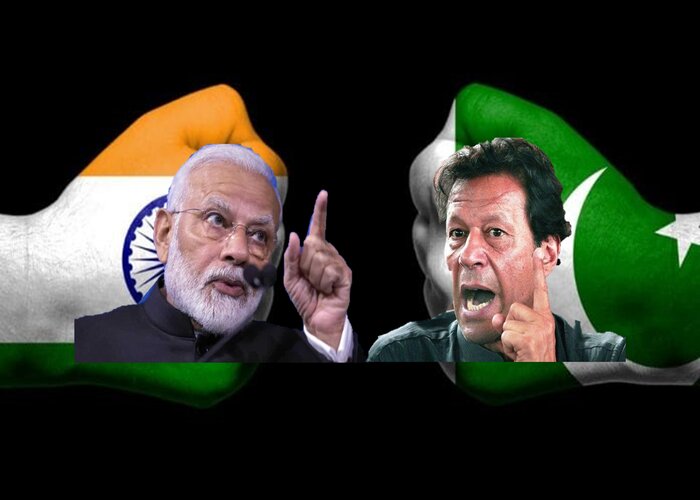By Kumar Ketkar, MP. First published in The Print on 7 October, 2019
When Prime Minister Narendra Modi was in the US for the United Nations General Assembly’s 74th session, a media blitzkrieg was underway at home. All newspapers, TV studios and FM radio channels besides public broadcasters repeated ad nauseam the same lines, same comments, same anecdotes, and hugely exaggerated reports of Narendra Modi’s “unprecedented popularity”. But there was one more thing the coverage had in common.
In almost every panel discussion or news report, Pakistan Prime Minister Imran Khan was portrayed as a villain — like the characters Pran or Prem Chopra played in their heyday. Or as a vainglorious warmonger who also defended global terrorism. Some made fun of him and ridiculed him while trolls on social media worked overtime, creating fake news and morphed photographs to show how Imran Khan had been completely sidelined by the international diplomatic community.
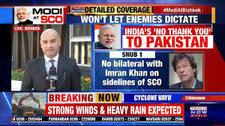
But trolls did what they always do. Why did Indian media not do its basic job — of presenting “both sides” of the story? Back in the time when news stories and articles would pass through at least three filters before they appeared in the print next morning, the one thing that would be ensured at all costs was that the writer had presented “both sides”. All journalism schools today teach this.
The Pakistan/Imran Khan factor
The panelists and editorial writers appeared to have come prepared with their almost abusive, critical reports on Imran Khan. So the least they could have done was televise or carry the text of his entire speech at the UN. But they didn’t.
The reason one expects the Indian media to do this is because it spends an unhealthy amount of time obsessing over Imran Khan and Pakistan. A large part of the Indian journalism today rests entirely on what Imran Khan or Pakistan says or does. Many a time, they enter prime time shows without having done or said anything — provocative journalists anchoring these shows imagine it all on their behalf.
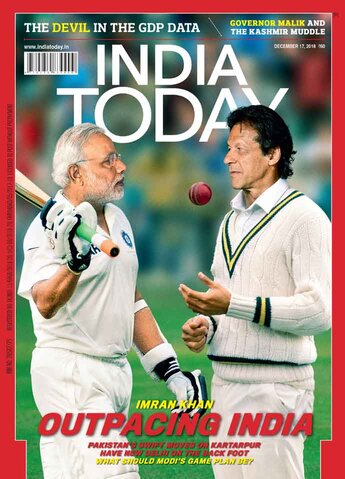
It wasn’t always the case, though. Not when Imran Khan was the most favourite cricketer of the game’s lovers. It was not so even after he decided to participate in electoral politics. Some leading anchors had even interviewed him live.
But things have clearly changed in the past few years. So, if the TV studios are going to weave elaborate (read flimsy, dramatic) debates centred on Imran Khan and Pakistan, shouldn’t they at least do the basic job of presenting what the PM says in its entirety?
Imran Khan eloquently exposed the hypocrisy and brazen doublespeak by US President Donald Trump and India’s Prime Minister in their bonhomie at ‘Howdy, Modi!’ extravaganza in Houston, Texas.
The critics could have still analysed, interpreted and condemned Imran Khan the way they wanted, but they chose to deny the opportunity to their viewers and readers of what the other side had to say. So why does Indian media do it?
Indirect focus on Indian Muslims
It goes with the ruling Bharatiya Janata Party (BJP) and its ideological mentor Rashtriya Swayamsevak Sangh’s (RSS) line of thinking that Pakistan and its PM are demons who must be constantly demonised for international media and politics. But more crucially, it serves the purpose at home — of demonising Indian Muslims.
For as long as we can remember, stalwarts in the BJP have often held the rhetoric that anybody who criticises the Modi government should go to Pakistan. The anti-Muslim campaign is synonymous with Pakistan, and Imran Khan is merely the face for that incessant hate and trolling.
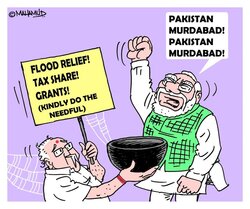
Addressing a gathering of party workers recently, BJP president Amit Shah explicitly said that all Hindus, Sikhs, Christians, Buddhists, Jains, Jews are welcome to come and seek citizenship in India. He didn’t say Muslims because it’s them he and his party want to drive out of India. For Amit Shah and the BJP, they are “termites” who have “illegally infiltrated” into Assam and West Bengal from neighbouring Bangladesh.
The BJP’s IT cell and social media handlers often mislead the Indians (Hindus) by referring to the Hindu population in Pakistan, which they claim has drastically reduced from what it was at the time of Partition in 1947. But they do not say that after Pakistan’s partition and creation of Bangladesh in 1971, the demographic balance also changed. Many Hindus from Pakistan migrated to Bangladesh and from Bangladesh to India.
This shows how obsessed the Sangh Parivar still is with India’s Partition that it equates Indian Muslims with Pakistanis or their agents. Essentially, it is keen to take the “two-nation” theory to its “logical conclusion”. This effectively means that not only does it endorse the Partition, but wants another one.
India’s loss, ultimately
The majoritarian agenda of invoking the plight of Hindus in Pakistan is done to whip up communal frenzy against Muslims in India. In essence, Pakistan bashing is Muslim bashing in India. From kids in school to celebrities and common citizens, Muslims in India today are told to go to Pakistan. This bigoted stance helps the BJP create a narrative that Indian Muslims are Pakistanis and don’t belong here.
This narrative is then coupled with the demonisation of Pakistan and its PM. Indian media loudly (and with great delight) discusses the grave economic crisis that Pakistan is facing, but there’s hardly ever a show discussing the frightening plight of our own country’s economy.
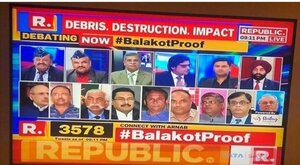
On all these elite TV channels, what we sacrifice is “objective” journalism. Then we blur the lines between government propaganda and news. To that extent, journalism’s elevation to “media” has destroyed the credibility of this profession. And the Indian public is not bothered because it has been forced into keeping its attention fixated on Pakistan and Imran Khan — and thus on Indian Muslims.
It’s ironic then that while Indira Gandhi managed to schism East Pakistan from Pakistan resulting in the formation of Bangladesh, PM Modi’s relentless antagonistic focus has actually achieved an opposite result. For the first time in years Pakistan and Bangladesh are in quiet talks to heal the acrimony of the last few decades. And that will only result in India being surrounded on all sides by neighbours friendly with each other but not with India. A very clearly undesirable diplomatic outcome for India.
Disclaimer: The opinions expressed within this article are the personal opinions of the author. AlignIndia does not take any responsibility for the content of the article.
Kumar Ketkar, MP, is an Indian journalist, writer and politician. Currently a member of the Rajya Sabha from maharashtra, he was associated with leading India publications, such as Dainik Divya Marathi, The Economic Times, Loksatta, etc.


